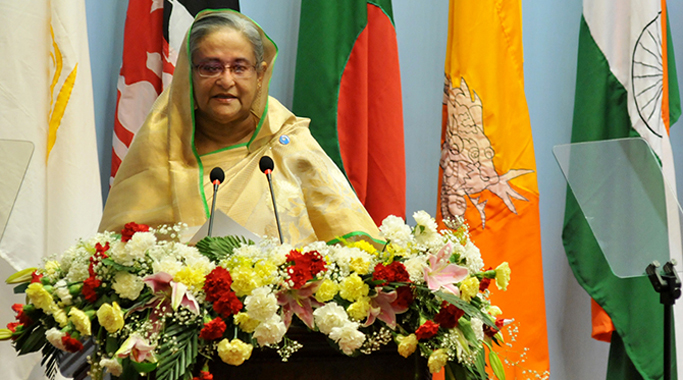Kathmandu, Nov 26 Bangladesh Prime Minister Sheikh Hasina Wednesday called for implementing the free trade agreement (FTA) that the Saarc nations signed nearly a decade ago.
In her address to the 18th South Asian Association for Regional Cooperation summit here, Hasina underlined the need to implement the South Asian Free Trade Agreement (Safta), Xinhua reported. The accord was signed by the Saarc member states Jan 6, 2004, at the 12th Saarc Summit in Pakistan’s capital Islamabad.
Safta required the developing countries in South Asia — India, Pakistan and Sri Lanka — to bring their duties down to 20 percent in the first phase of a two-year period ending in 2007.
In the final five-year phase ending 2012, the 20 percent duty was to be reduced to zero in a series of annual cuts.
The least developed nations in South Asia — Nepal, Bhutan, Bangladesh, Afghanistan and the Maldives — have an additional three years to reduce tariffs to zero.
The Safta agreement came into force Jan 1, 2006.
Hasina lamented the “rather modest” achievements of the Saarc, but expressed confidence in the regional group’s potential to achieve significant results.
“People want to see robust action on the ground. They are more focused on results rather than the process,” she said at the summit.
On poverty reduction, Hasina said a Saarc food bank and seed bank were necessary to reduce the high incidence of poverty in the region that accounts for one-fifth of the world’s population.
The Bangladesh prime minister also called for efforts to strengthen cross-border cooperation on climate change, skills development and transportation.
According to Hasina, a “candid assessment and frank discussions” among the member states are essential for adding dynamism to the Saarc.
Established in 1985 in Bangladesh, the Saarc is a regional association of eight south Asian countries, namely Afghanistan, Bangladesh, Bhutan, India, the Maldives, Nepal, Pakistan and Sri Lanka.
